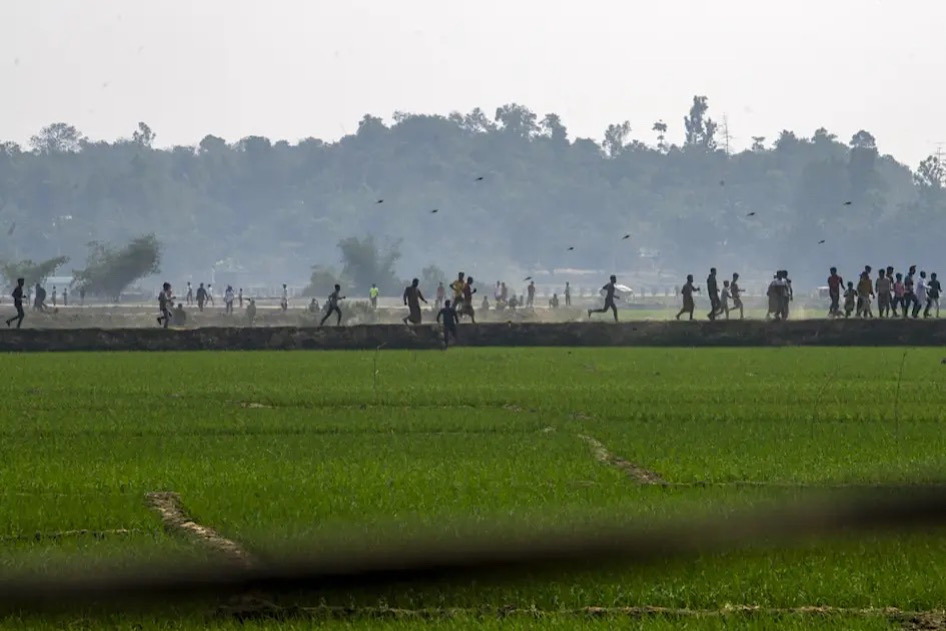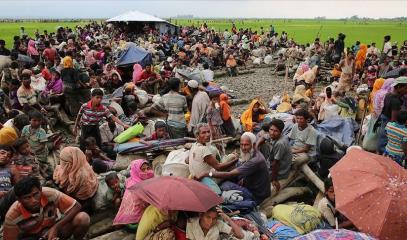Allegations of Arakan Army 'ethnic cleansing' of Rohingya
Activist movements report testimony from survivors of persecution at the hands of the rebel group fighting the army. On Aug. 5, dozens (or hundreds) of Muslims, including young children, killed in a drone and artillery attack as they tried to flee. More than 250,000 Rohingya have been homeless in Buthidaung and Maungdaw since April.
Yangon (AsiaNews) - In Myanmar, the spotlight is back on the violence against the Rohingya Muslim minority in the western state of Rakhine, already the target of a brutal campaign of persecution by the military between 2016 and 2017.
According to reports by some pro-human rights activist movements, and from the testimonies of some survivors, a deadly campaign of ethnic cleansing has been underway for weeks at the hands of the Arakan Army, the Rakhine ethnic independence militia fighting the coup army.
“Rohingya and Rakhine civilians are bearing the brunt of the atrocities being committed by the Myanmar Army and Arakan militias,” denounces Elaine Pearson, Asia director of Human Rights Watch (Hrw), in a report released this week.
The document directly accuses the junta and Aa forces of “extrajudicial killings and widespread arson.” Both sides, the expert continues, are stoking “hate speech, attacks on civilians and massive arson to drive people from their homes and villages, raising the specter of ethnic cleansing.”
In one of the latest incidents, contested by the Arakan Army, dozens of Muslim Rohingya, including many young children, were reportedly killed in a drone and artillery attack on August 5 as they tried to flee Myanmar.
According to reports, to escape the violence in Maungdaw town in Rakhine State, the Rohingya families were standing on the bank of the Naf River waiting to be allowed to cross into Bangladesh when they were hit by militiamen. On the same day, a boat carrying some Rohingya across the river across the border reportedly came under drone attack by the Arakan Army.
Two other overloaded boats carrying dozens of fleeing members of the Muslim minority reportedly capsized, leaving most of the passengers to drown. Reports gathered by Voice of America (Voa) speak of at least 200 Rohingya killed, with pictures and videos re-released on social media showing bodies of men, women and children strewn along the bank of the river that marks the border between the two countries.
In the following days, officials in Dhaka confirmed the discovery of 34 bodies floating in the Naf River near Shahpori Island, part of the victims of the Arakan rebel attack three days earlier. In a note, Arakan Army leadership denied involvement, stressing that the deaths “did not occur in areas under our control and are not related to our organization.”
Nonetheless, Rohingya activist Nay San Lwin, co-founder of the Free Rohingya Coalition, told Voa that insurgents have been violently targeting Rohingya villages since April, torching thousands of homes and causing hundreds of thousands of displaced people to be deprived of their homes.
Myanmar has been engulfed in a bloody civil war that has claimed the lives of thousands of civilians since 2021, when the military retook power in a coup. In recent months, a coalition of ethnic rebel forces, including the Arakan Army itself, has stepped up its offensive to oust the junta, which has been driven out of large areas in Shan, Chin and Rakhine states.
For more than 50 years, the Rohingya Muslim minority has fled to neighboring countries, including Bangladesh or as far away as Vietnam, modern “boat people,” to escape persecution and discrimination in a Buddhist-majority Myanmar.
According to the Free Rohingya Coalition, more than 250,000 Rohingya have been homeless in Buthidaung and Maungdaw since April. Fortify Rights, an international human rights group based in Southeast Asia, says it has documented killings and arson by the Arakan Army in Rohingya villages in Rakhine.
Alarmed by the escalation of violence, the Special Advisory Council (Sac) for Myanmar, a group made up of independent international experts, is addressing the militiamen directly, asking them to work with the Bangladeshi government to establish a humanitarian corridor.
A safe route, they add, also to provide humanitarian assistance to all communities in Rakhine state and the establishment of protected areas. At the same time, the activists call for the formation of an international fact-finding team that can access the western state and investigate the ongoing violence, fulfilling its obligations under international law.
Next Aug. 25 marks seven years since the beginning of the massive atrocities in 2017, during which thousands of Rohingya men, women, boys and girls were killed in the course of mass murder, gang rape and rape, torture, burning and arson by the Burmese army.
About 75 percent of the one million Rohingya in the area have been forced to flee to neighboring Bangladesh. To date, victims still await justice and accountability, while new atrocities are added to old ones.
Total impunity for perpetrators of gross violations of international law in Myanmar, the activists conclude, ensures the conditions “for the continuation of atrocities against civilians, as evidenced by this latest massacre. The international community must do more to bring justice and finally end impunity.”
06/12/2023 14:07
11/08/2022 14:35








.png)










